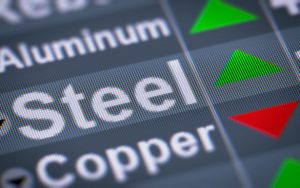Nucor Reports Highest Earnings Since 2008 Despite Rising Imports
Nucor Corporation announced its 4Q and 2017 full-year earnings during its quarterly earnings call Tuesday afternoon.
Need buying strategies for steel? Try two free months of MetalMiner’s Outlook
For the fourth quarter of 2017, Nucor reported consolidated net earnings of $383.9 million, or $1.20 per diluted share, compared with net earnings of $254.9 million ($0.79 per diluted share) for the third quarter of 2017 and $159.6 million ($0.50 per diluted share) for the fourth quarter of 2016.
For the year as a whole, Nucor reported consolidated net earnings of $1.32 billion, or $4.10 per diluted share, for fiscal 2017 compared to $796.3 million, or $2.48 per diluted share for fiscal 2016.
Chief Financial Officer Jim Frias said Nucor achieved “significantly better than expected” results in its sheet and bar mills during December.
“The Nucor team faced a very challenging marketplace in 2017,” Frias said. “Finished steel imports increased 12% from 2016, driven by unacceptably high levels of illegal trade.”
Despite rising imports and a sluggish non-residential construction market, Nucor delivered its highest earnings since 2008, he added.
“We believe our 2017 performance provides strong evidence that Nucor’s strategy for profitable growth is working,” Frias said.
In the automotive realm, Nucor increased its automotive market shipments in 2017 by 7% year over year, up to 1.5 million tons of sheet and engineered bar products.
Looking ahead, Frias said 1Q 2018 earnings are expected to increase compared to the fourth quarter of 2017 “exclusive of the benefit related to tax reform.” Excluding that net benefit of about $175 million, CEO and President John Ferriola said the company’s 2017 earnings more than doubled its annual average earnings of $483 million over the previous seven years.
Markets for Nucor products like beams, rebar, merchant bar and plates — which accounted for about 45% of Nucor’s total steelmaking capacity — were challenging this past year, Ferriola added.
Ferriola also touched on import levels, which he said remained “a very serious problem” last year. Finished steel imports occupied an approximately 27% share of the U.S. market, according to the American Iron and Steel Institute’s most recent imports report. The import market share was approximately 22% for December.
In addition to those market headwinds, unplanned outages at Nucor’s Louisiana DRI facility also impacted operations, leading to the plant’s production hitting less than half of its capacity in 2017, Ferriola said.
The firm announced two new projects this past November.
The company plans to build a new rebar micro mill in Sedalia, Missouri, which represents at least $250 million in new investments, according to a Nucor release. The mill, which has an expected startup of late 2019, will boast an approximate capacity of 350,000 tons, Ferriola said.
Given the distance that rebar has to travel to reach the Upper Midwest and Plains markets, the Sedalia mill’s location — about 90 miles east of Kansas City — will give Nucor a “sustained cost advantage” over other domestic steel producers, according to Ferriola.
MetalMiner’s Annual Outlook provides 2018 buying strategies for carbon steel
In addition, the company announced plans to build a full-range merchant bar quality mill at its existing steel mill in Bourbonnais, Illinois. According to the release, the mill — expected to cost $180 million and also with an expected startup in late 2019 — will have an annual capacity of approximately 500,000 tons.
On the policy front, Ferriola said — seven hours before President Trump’s first State of the Union address — the company hopes to get some good news regarding a “long overdue” infrastructure plan.
“When you look at infrastructure and you look at Nucor and the breadth of our products, when we get that badly needed infrastructure plan — and we’re going to get it someday because we need it someday — there’s no company that is positioned better than Nucor to participate in that infrastructure build,” Ferriola said. “We won’t see the benefits right away, but when they do flow down to us we will be positioned in our industry better than most to take advantage of that infrastructure build.”



Leave a Reply